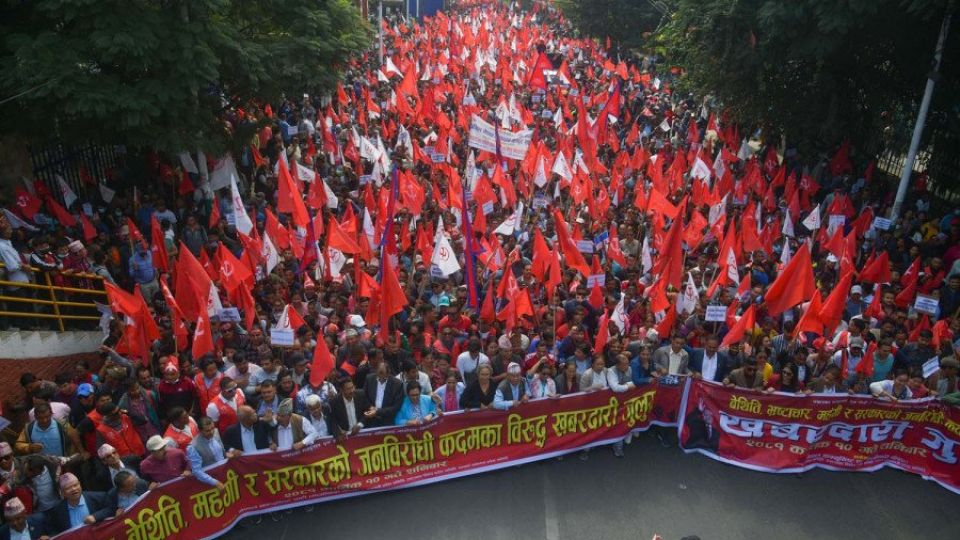October 28, 2024
KATHMANDU – CPN (Maoist Centre) chair Pushpa Kamal Dahal, addressing a mass gathering organised by the party in Kathmandu, stressed two issues on Saturday—that his party wasn’t in a hurry to bring down the present government and that they took to the streets to expose the government’s bad governance.
Dahal claimed his party is now focused on introspection, reviewing the party’s activities and connecting with the people.
Addressing the gathering, which was also projected as a show of force by the main opposition party, Dahal claimed the top Maoist leadership has undpledgedertaken a serious review of the party’s activities and that they won’t engage in any manoeuvring to topple the present government.
“Our party made a mistake by forging alliance with reactionary forces in the past but we now vow not to repeat that mistake,” Dahal said.
He to be honest with the people hereon.
“Rest assured and run the government, don’t worry much about whether the Maoists will again come to power.”
Observers, however, doubt Dahal’s claim as it has only been just over 100 days since the Maoist party was ousted from the government. They also say the party, while being in the government for most of the past decade or so, hasn’t achieved much.
Moreover, whatever Dahal might say, there is no way to remove the government unless there is a tussle between the two major coalition partners—the Nepali Congress and the CPN-UML.
The observers thus see the Maoist Centre’s protest as an outcome of the Maoist leaders’ restlessness over being out of the government for some months.
In the 275-strong House of Representatives that elects the prime minister, the biggest coalition partner, the Congress, has 88 seats while the prime minister’s UML party has 78 seats. Thus the two largest coalition partners alone command a comfortable majority. Some other fringe parties have also joined the government.
Maoist Centre General Secretary Dev Gurung says Dahal addressed the issue after a meeting of the ruling parties on Friday concluded that efforts were on to topple the government.
“Attempts to seek an alternative to the democratic system and government cannot be acceptable,” said the seven-point joint statement of the ruling parties.
Gurung said that they just tried to clear the misconception.
“Despite having a majority in the House, the way they are panicking about a possible government change is something unusual,” he said.
Political experts said the only way to change the government at present is by proving a majority in the House.
“The Maoists always get restless when they are not in the government, and it is no different now,” Mumaram Khanal, a political analyst, told the Post. “Today’s agitation is nothing but a means to show that the party’s relevance will remain intact until the next elections.”
The Maoist Centre is a party that has been in power for most of the nine years since the promulgation of the constitution in 2015.
But why did the party have to call for a protest no sooner than it had left the government?
Maoist Centre General Secretary Gurung refused to answer the question.
But when the same query was put before Agni Sapkota, vice-chair and spokesperson for the Maoist Centre, he accused the Oli government of failing on all fronts save for its initiative to push for the completion of the peace process. “That is one reason which compelled us to organise a meeting of this kind,” Sapkota said.
After the formation of the UML-Congress coalition in mid-July, the ruling parties including the main opposition have amended the transitional justice related law.
Similarly, the party leaders who spoke at the mass gathering on Saturday raised questions about the prime minister’s prolonged absence from the country even as Nepal was being ravaged by floods and landslides.
Prime Minister Oli was in the United States to attend the United Nations General Assembly at the time. Some people then accused the prime minister of showing insensitivity after he refused to cut short his US trip.
When the Post talked to some participants of Saturday’s mass gathering, they struggled to come up with a rationale for the protest programme.
But a few of them did question the Oli government’s record on governance and the prime minister’s supposed protection of the corrupt people in the government even while cracking down on those from opposition parties.
They also questioned the UML’s acceptance of a piece of expensive real estate from a controversial businessman.
Min Bahadur Gurung, the owner of Bhatbhateni supermarket, on October 11 donated land to build the UML head office. Gurung is facing multiple corruption and fraud cases in court.
“The Oli government has failed on multiple fronts and is working to protect the corrupt people,” one participant told the Post. “The previous government [led by Dahal] was toppled after it tried to prosecute corrupt politicians.”
During his address, Dahal asked for answers from the government on the status of the investigation on the Bhutanese refugee scam, as well as on other alleged fraud cases such as the Bansbari land grab and Giribandhu Tea Estate scam. Dahal accused the government of protecting corrupt officials and sidestepping accountability measures. “This government appears to have been formed to shield—not expose—corruption,” he said.
The Maoist chief also questioned why leaders from the UML and the Congress who have also been accused of misappropriating funds from various cooperatives, have faced no action. “Those named in the [parliamentary panel] report should be investigated and arrested if guilty,” he said, adding that selectively targeting opposition members for investigation is unjust.
But political analyst Khanal doesn’t buy the argument. “Until today, which government has taken action against powerful people?” he questions.
“What Dahal is saying is propaganda,” Khanal told the Post.
While the Maoist Centre is accusing the government of not acting against some suspects in corruption scams, Khanal questioned why the suspects were not brought under the purview of the law while Dahal was the prime minister.


